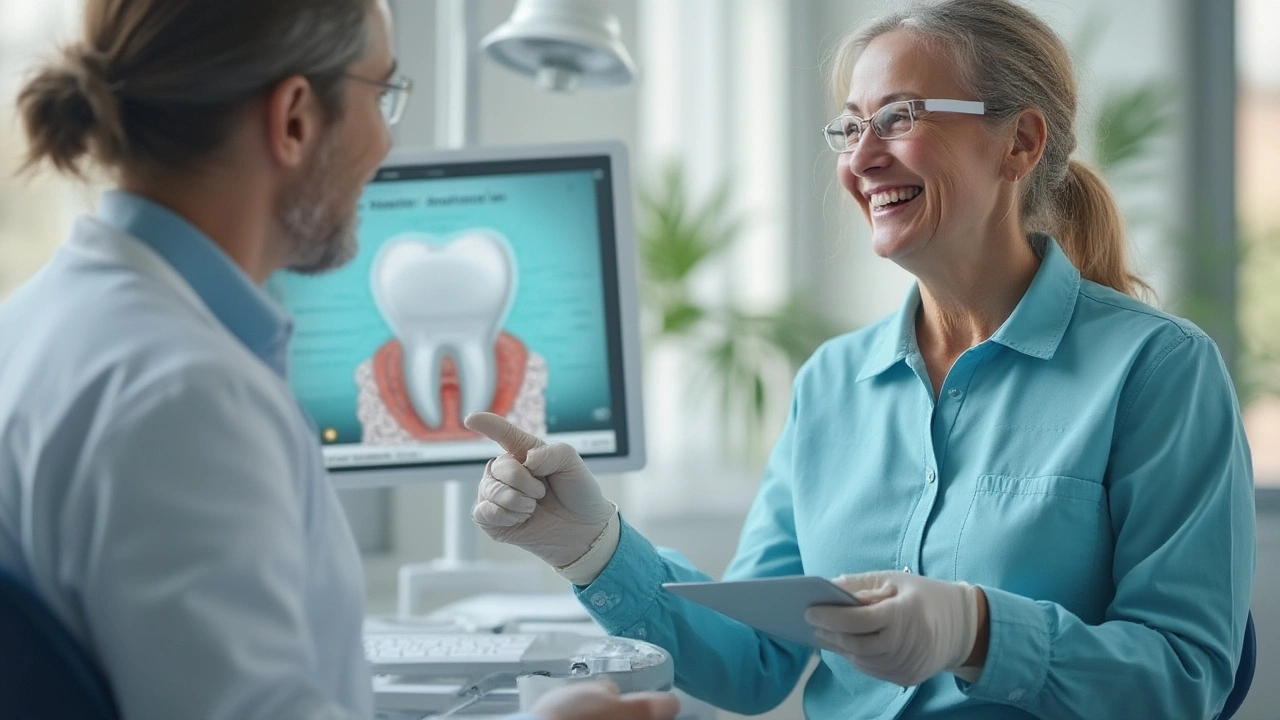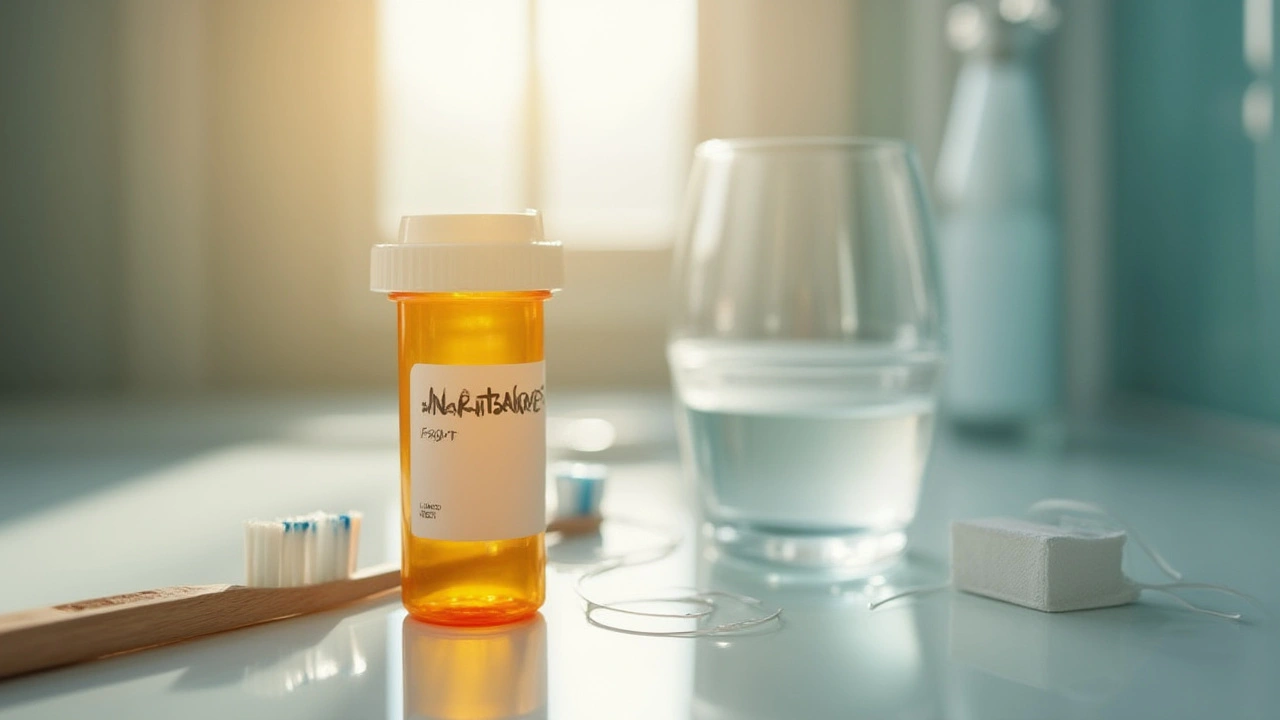Dry mouth, sensitive teeth, and receding gums—most people never expect to hear those words outside the dentist’s chair. Yet if you’re on anastrozole, this pill isn’t just working its hormone-balancing magic on breast cancer, it’s crashing the quiet party in your mouth, too. Maybe you’ve just spotted blood on your toothbrush, or your dentist has that look in their eye before they deliver some bad news. Turns out, the link between this medication and dental health is real—and often underestimated by both patients and doctors.
Understanding Anastrozole: Uses and Side Effects
Anastrozole is best known as an aromatase inhibitor—mainly prescribed to postmenopausal women battling hormone receptor-positive breast cancer. The way it works is by cutting off the body’s conversion of androgens to oestrogen. Less oestrogen means less fuel for cancer—simple, but not without fallout. One less talked about side effect is how it messes with your mouth, teeth, and jaw bones. About 7 out of 10 users will experience joint or bone symptoms, but what about the dental stuff? Not so obvious unless you’re looking for it.
Let’s break down why this matters: Oestrogen doesn’t just keep menstrual cycles regular, it’s key for bone density. When you drop your oestrogen levels, bones all over your body—including those in your jaw—can lose their backbone. This is why many people on anastrozole deal with osteoporosis or weaker bones. A study out of King’s College London found postmenopausal women on aromatase inhibitors had around a 20% higher risk for fractures, including those small cracks that can mess with your jaw health and teeth stability. So, if you’re feeling more tooth pain or see gum changes, you’re not imagining it.
But the side effects don’t stop at the bone. Dry mouth (xerostomia) is common, and a dry mouth can lead to cavities and gum disease faster than nightly ice cream binges. Patients report thicker, stringier saliva, and some even notice changes in how food tastes. Others deal with ulcers or burning mouth syndrome. Stopping anastrozole isn’t usually an option, so the real question is how to dodge the worst of it.
How Anastrozole Influences Oral Health
Think of your mouth as a battleground. Less oestrogen, thanks to anastrozole, means tissues thin and don’t heal as easily. Gums that once clung faithfully to your teeth start slipping. Enamel chips, teeth shift, and there’s more space for bacteria to set up camp. There’s a proven link between aromatase inhibitors and a drop in bone mineral density (BMD)—one study in the British Dental Journal clocked BMD losses at up to 11% after five years on treatment. Your mandible and maxilla (the jaw bones) aren’t immune. It’s not rare for dentists to spot early bone loss during routine X-rays in patients who never had this problem before anastrozole.
In Bristol and across the UK, NHS dentists are reporting more patients with unexplained gum disease, loose teeth, dry mouth complaints, and non-healing mouth sores. The number of women on long-term hormone therapy is growing, so this isn’t some rare event. A 2024 NICE guideline highlighted the need for better mouth monitoring in patients taking aromatase inhibitors. In short, doctors are being nudged to ask about dental checkups—about time, right?
Let’s not ignore dry mouth. Saliva’s not just spit; it protects tooth enamel, washes away food particles, and even helps control bacterial growth. Without enough saliva, tooth decay runs rampant and the risk of fungal infections like thrush jumps. Some folks notice a constant feeling of stickiness or need to sip water every few minutes, especially at night.
See a connection between these issues? Weak jaw bones, unhappy gums, and less protective spit add up to a higher risk for tooth loss, oral infections, and pain. If you’ve had dental implants or plan to, this can spell trouble since jaw bone density is what holds them in place.
| Oral Health Issue | How Common in Anastrozole Users |
|---|---|
| Dry Mouth (Xerostomia) | Over 35% |
| Gum Disease (Periodontitis) | About 25% |
| Jaw Bone Loss (Osteopenia) | Up to 40% |
| Dental Decay | 20%-30% |
| Non-Healing Mouth Ulcers | Approx. 10% |
Teeth feel looser than before? That’s a red flag. If your gums look pale, thin, or bleed easily, it’s worth bringing up with your dentist, loudly and often. Your mouth, not just your bones, is asking for help.

What to Tell Your Dentist When Taking Anastrozole
Loads of people forget to mention they’re on anastrozole—or underestimate how much it matters. Your dentist isn’t just checking for that sneaky bit of spinach in your teeth, they’re scanning for subtle changes that can turn into serious trouble. Honest conversations are huge. Always list anastrozole (and any other meds on your sheet) at each appointment. Don’t just stick with the generic name—say “aromatase inhibitor for breast cancer” so there’s zero confusion.
If you don’t feel the effects, bring it up anyway. Too many folks wait until there is pain, but bone loss and gum issues can creep in quietly. If you’ve had any recent headaches, jaw tightness, or see signs like chronic soreness or weird sensations in your mouth, these details help your dentist spot problems early. Don’t gloss over a dry mouth either—good dentists have seen this before, but only if you give them the tip-off.
Dental X-rays show bone changes before symptoms turn up, so sharing that you’re on anastrozole can prompt more regular monitoring. You may also need more frequent dental checkups—every four to six months isn’t excessive. If you’re considering implants, crowns, or dentures, your dentist needs to know about your bone health. Healing can slow down, and there might be a higher risk of infection after procedures.
If your dentist suggests seeing a periodontist or other specialist, don’t drag your feet. These are the folks who can offer advanced treatments—gum grafts, bone regeneration therapies, and custom cleaning routines. Ignore it, and that “minor” dental drama can become very expensive, very fast.
Finally, don’t skip on sharing this info with other healthcare providers. GPs, oncologists, and even your pharmacist play a role in how your medication is managed alongside your dental treatments. Sometimes adjustments to your medication or additional supplements (like calcium or vitamin D) are needed.
Daily Habits to Protect Your Teeth While Using Anastrozole
Surviving anastrozole’s side effects isn’t just about toughing it out—it’s about stacking the deck in your favour. You’ll want to go way beyond the “brush twice a day” routine. An electric toothbrush is worth every penny; it removes more plaque and is gentle on receding gums. Swap to a toothpaste high in fluoride—some brands in the UK offer prescription-strength options. For those battling dry mouth, special gels and mouthwashes can make a world of difference. Stay away from alcohol-based rinses, though—they dry your mouth out even more.
Think hydration: carry a bottle everywhere and take sips often. Chewing sugar-free gum (with xylitol) can also boost saliva production. Keep an eye on snacks, especially sticky sweets or starchy foods—these feed bacteria and make matters worse. Instead, go for cheese, nuts, and crunchy veggies. They fight decay rather than causing it. If you smoke or drink heavily, this is a good time to try quitting; your mouth can’t cope with added stress right now.
Don’t neglect the space between your teeth. Flossing (or using interdental brushes) every evening knocks out plaque where regular brushes don’t reach. If your gums bleed, keep going gently—stopping will just make the problem worse. Rinsing after meals can also wash away food debris if brushing isn’t possible.
Regular professional cleanings are essential. Ask your dentist about topical fluoride treatments—these can strengthen weakened enamel and help prevent decay. For anyone prone to mouth ulcers, avoid sharp or acidic foods, and dab on a protective ointment if your dentist recommends one. Keep tabs on your calcium and vitamin D intake. Both play a role in bone health, and supplements may help, especially if your doctor says your levels are low.
Lastly, track your symptoms in a notebook or phone app. If you spot sudden changes—more tooth sensitivity, mouth pain, or bleeding—flag them up fast. Early action saves teeth, money, and misery down the line.

When to Seek Extra Help: Warning Signs to Watch Out For
You can do everything right and still run into surprises. Watch for these warning signs: sudden tooth looseness, gum swelling that doesn’t go away, ulcerated spots that linger for over a week, or burning sensations in your mouth or tongue. If any of these pop up, book an urgent appointment with your dentist. Swollen, bleeding, or pale gums need checking right away—loss of bone can happen fast, and infections can spread even faster.
If you develop pain when chewing, jaw stiffness, or difficulty opening your mouth fully, don’t just blame it on stress or grinding. Anastrozole can cause subtle inflammation or bone loss that needs a specialist’s attention. Similarly, if dentures or bridges suddenly don’t fit, this can be another tip-off that your jaw is changing shape under the radar.
Be extra wary of fevers, swollen neck glands, or severe mouth pain—that’s when infections could be brewing that need antibiotics or urgent care. If your mouth feels constantly dry, with cracks in the corners or new white patches, fungal infections like thrush may have taken hold. These all need fast treatment, so don’t wait for your next routine appointment.
Don’t just hope it’ll go away. Keep in regular touch with your dental team, let them know about any new meds or diagnoses, and keep following up on their advice—even if it feels like overkill. It’s the difference between losing a tooth and saving your smile. Your mouth is one of your body’s early warning systems—don’t ignore what it’s trying to tell you.

14 Comments
Michael Friend
Anastrozole isn't some benign little pill-it's a systemic hormone sledgehammer. The fact that dental teams aren't routinely screening for bone density changes in these patients is criminal negligence. I've seen three cases in my oncology clinic alone where patients lost teeth they never expected to lose. No one warned them. No one connected the dots. This isn't anecdotal. It's epidemiological.
Jerrod Davis
It is imperative to acknowledge that the pharmacological inhibition of aromatase may precipitate a cascade of systemic effects, including but not limited to alterations in mandibular and maxillary bone mineral density. The literature, while emerging, is unequivocal in its association between aromatase inhibitors and periodontal deterioration. Clinicians must integrate oral health assessments into standard-of-care protocols for patients undergoing endocrine therapy.
Asbury (Ash) Taylor
You're not alone in this. I’ve been on anastrozole for 4 years. My dentist was shocked at my bone loss-said I looked like a 70-year-old smoker, and I’m 58 and never smoked. But here’s the good news: I started using prescription fluoride toothpaste, chew xylitol gum religiously, and drink water like it’s my job. My gums stopped bleeding. My teeth feel solid again. It’s not magic-it’s discipline. You can fight this.
Kenneth Lewis
lol so anastrozole messes up your teeth? no way. jk. i just got back from the dentist and he said my gums are receding like crazy. i thought it was from brushing too hard. turns out its the meds. i’m using the weird dry mouth gel now. its sticky as hell but at least i dont feel like my tongue is glued to the roof of my mouth anymore 😅
Jim Daly
why do all these articles sound like they were written by a pharma rep? anastrozole is just another cancer drug that screws you over. they don't care about your teeth. they care about your survival. too bad your smile goes with it. just take the pill and suck it up. you think your dentist gives a damn? he just wants your money for the next cleaning.
Tionne Myles-Smith
I’m so glad someone finally put this out there. I was terrified when my gums started bleeding and my teeth felt loose-I thought I was failing at self-care. Turns out, it’s the medication. I started seeing a periodontist every 4 months, using a Waterpik, and taking calcium with vitamin D. I still have my teeth. I still smile. And I still beat cancer. This isn’t the end of your oral health-it’s a new chapter. You’ve got this.
Leigh Guerra-Paz
Just a gentle reminder, please-please, please-do not wait until you’re in pain to mention anastrozole to your dentist! I’ve had patients come in with advanced bone loss, and when I ask about meds, they say, “Oh, I forgot to mention I’m on that breast cancer pill.” If you’re on it, your mouth is on high alert. Treat it like a bomb squad situation-don’t wait for the explosion.
Jordyn Holland
Oh wow. A whole article about teeth? How quaint. Next you’ll be writing a 5,000-word essay on how chemotherapy affects toenail fungus. We’re talking about life-saving cancer treatment here, not a spa day for your molars. If you’re losing teeth, maybe you should’ve prioritized flossing before you got cancer. Just saying.
Jasper Arboladura
The cited King’s College study has methodological limitations: small cohort, retrospective design, confounding variables including pre-existing periodontal status and concomitant bisphosphonate use. The 20% fracture risk increase does not directly extrapolate to alveolar bone resorption. Furthermore, xerostomia prevalence is often overestimated due to subjective reporting bias. The real issue is inadequate dental literacy among oncology teams, not pharmacological malfeasance.
Joanne Beriña
Why is the UK even letting this happen? In America, we don’t let Big Pharma ignore side effects like this. Our dentists are trained to flag this stuff. We have protocols. We have awareness. This is why the rest of the world needs to stop being so passive. You don’t just ‘hope’ your jaw doesn’t crumble-you demand action. And if your doctor doesn’t give it to you? Find a new one.
ABHISHEK NAHARIA
Interesting how Western medicine focuses on symptoms rather than root causes. In Ayurveda, dry mouth and bone degradation are seen as Vata imbalance-caused by stress, poor digestion, and hormonal suppression. Instead of fluoride gels, one should practice oil pulling, consume ghee, and regulate circadian rhythm. The body is not a machine to be patched. It is a living system. But of course, Western science prefers pills over philosophy.
Hardik Malhan
Given the AR inhibition mechanism, the downregulation of RANKL/OPG signaling in osteoblasts is the primary driver of alveolar bone turnover disruption. Clinical correlation with periodontal pocket depth and CBCT-derived BMD metrics confirms significant osteopenic changes. Prophylactic calcium-vitamin D supplementation shows marginal benefit; however, teriparatide remains contraindicated due to oncologic risk profile. Optimal management requires multidisciplinary coordination between oncology, periodontology, and nutrition.
Kelsey Worth
Okay but… what if you’re a guy on anastrozole? I thought this was just for women. My uncle’s on it for prostate cancer. His dentist just shrugged and said ‘oh, that’s normal.’ He lost two teeth last year. No one told him anything. This article is great-but why does it feel like it’s written for women only? Men get this too. We’re just invisible.
shelly roche
My mom’s been on anastrozole for 6 years. She’s 72. Still has all her teeth. She drinks water, uses the fluoride rinse, and chews gum after meals. She also has the most beautiful smile-still laughs loud, still kisses grandkids. It’s not about being perfect. It’s about being consistent. You don’t have to be a dental warrior. Just be a little bit brave every day. And if you’re reading this? Thank you for sharing this. It matters more than you know.